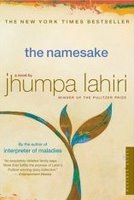Beyond FICTION: THE NAMESAKE by Jhumpa Lahiri
 Not only has Jhumpa Lahiri come to terms with her own hyphenated identity as an Indian-American, she has embraced the condition she shares with so many. The immigration experience, something she calls a “frequently humiliating process,” is explored in detail in her 2003 novel, The Namesake.
Not only has Jhumpa Lahiri come to terms with her own hyphenated identity as an Indian-American, she has embraced the condition she shares with so many. The immigration experience, something she calls a “frequently humiliating process,” is explored in detail in her 2003 novel, The Namesake.Lahiri holds multiple degrees and is a Pulitzer-winning author. Her work is thoughtful and thought-provoking: Scenes and characters are presented in expert strokes; themes are woven into a tapestry of revelations large and small; habits and traditions are introduced and revisited so the reader not only gathers glimpses into but is engrossed in a lifestyle and all the wonder and bewilderment it entails.
A portrait of a family of immigrant parents and their first-generation Indian-American children, The Namesake provides important insights into the challenges often faced by people who live bicultural lives. One telling scene has the main character, an Indian-American man named Gogol, at a party with his American girlfriend’s parents and their friends. One woman comments that Gogol and his family must be immune to illness when they travel to India and Gogol tries to explain that they often do get sick while in Calcutta. “But you’re Indian,” the woman answers. “I’d think the climate wouldn’t affect you, given your heritage.” When Gogol’s girlfriend’s mother tries to intercede on Gogol’s behalf, she does more harm than good. She insists that he’s American, that “he was born here,” but then turns to him, bewildered for a moment. Gogol sees immediately that after months of knowing him, she still isn’t sure. “Weren’t you?” she asks.
In a recent essay for Newsweek magazine called “My Two Lives,” Lahiri describes her own frustrating childhood as a first-generation Indian-American. She writes that as a child she “sought perfection” and denied herself “the claim to any identity,” that for her “one plus one did not equal two but zero, (her) conflicting selves always canceling each other out.” “As an adult,” she eventually adds, “I accept that a bicultural upbringing is a rich but imperfect thing.”
As is a biracial upbringing for so many. Lahiri reveals much more than the details of Indian-American lives in The Namesake; she offers life lessons in understanding to those who are willing—and ready—to hear her story.








1 Comments:
I loved The Namesake and everything Lahiri writes. Enjoyed reading your take on it.
p.s. Thanks for the nice comment you left on my blog.
Post a Comment
<< Home